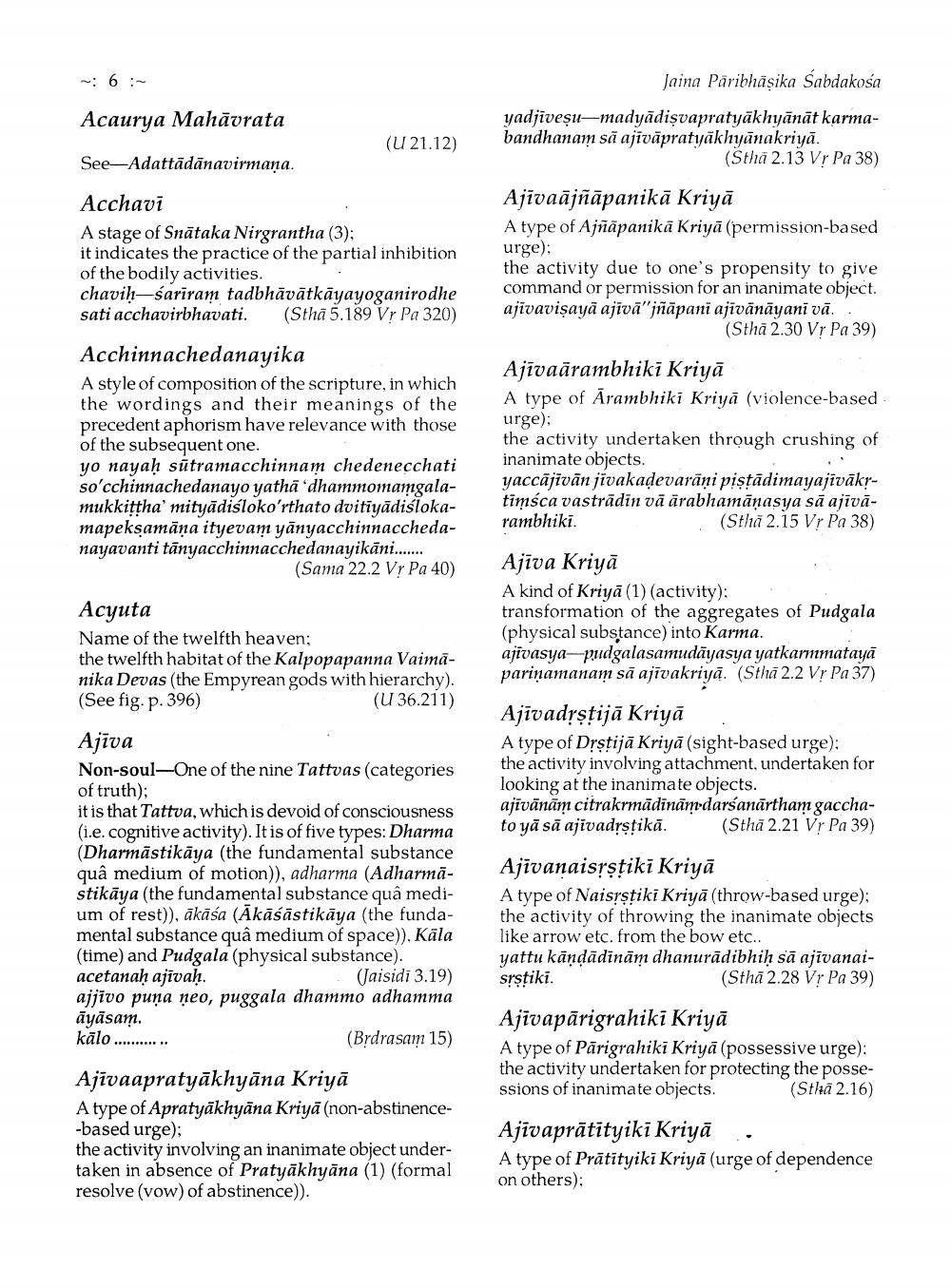________________
~6~
Acaurya Mahāvrata
See-Adattādānavirmaṇa.
(U 21.12)
Acchavi
A stage of Snataka Nirgrantha (3): it indicates the practice of the partial inhibition of the bodily activities.
chaviḥ sariram tadbhāvātkāyayoganirodhe sati acchavirbhavati. (Stha 5.189 Vr Pa 320)
Acchinnachedanayika
A style of composition of the scripture, in which the wordings and their meanings of the precedent aphorism have relevance with those of the subsequent one.
yo nayah sütramacchinnam chedenecchati so'cchinnachedanayo yatha 'dhammomamgalamukkittha' mityāädisloko'rthato dvitiyādislokamapekṣamāna ityevam yanyacchinnacchedanayavanti tanyacchinnacchedanayikāni........ (Sama 22.2 Vr Pa 40)
Acyuta
Name of the twelfth heaven; the twelfth habitat of the Kalpopapanna Vaimanika Devas (the Empyrean gods with hierarchy). (See fig. p. 396) (U36.211)
Ajiva
Non-soul-One of the nine Tattvas (categories of truth);
it is that Tattva, which is devoid of consciousness (i.e.cognitive activity). It is of five types: Dharma (Dharmastikaya (the fundamental substance quâ medium of motion)), adharma (Adharmastikaya (the fundamental substance quá medium of rest)), akasa (Akäsästikäya (the fundamental substance quâ medium of space)). Kala (time) and Pudgala (physical substance). acetanah ajivah. (Jaisidi 3.19) ajjivo puna neo, puggala dhammo adhamma āyāsam.
kālo
(Brdrasam 15)
********** "
Ajivaapratyakhyāna Kriyā
A type of Apratyäkhyäna Kriyä (non-abstinence-based urge):
the activity involving an inanimate object undertaken in absence of Pratyäkhyana (1) (formal resolve (vow) of abstinence)).
Jaina Paribhasika Sabdakosa yadjivesu-madyadiṣvapratyakhyānät karmabandhanam sa ajiväpratyakhyānakriya. (Stha 2.13 Vr Pa 38)
Ajivaājñāpanikā Kriyā
A type of Ajnapanikā Kriyā (permission-based urge);
the activity due to one's propensity to give command or permission for an inanimate object. ajīvaviṣayā ajīvā"jñāpani ajīvānāyaṇī vā. (Stha 2.30 Vr Pa 39)
Ajivaärambhiki Kriya
A type of Arambhiki Kriya (violence-based urge);
the activity undertaken through crushing of inanimate objects.
vaccājtoán juakadevanāi pistadimayajizakr. timśca vastradin vā ārabhamāṇasya sā ajīvārambhiki. (Sth 2.15 Vr Pa 38)
Ajiva Kriya
A kind of Kriya (1) (activity): transformation of the aggregates of Pudgala (physical substance) into Karma.
ajivasya pudgalasamudayasya yatkarmataya pariṇamanam sã ajivakriya. (Stha 2.2 Vy Pa 37)
Ajivadṛṣṭija Kriya
A type of Drṣṭijā Kriyā (sight-based urge): the activity involving attachment, undertaken for looking at the inanimate objects. ajīvānām citrakrmādīnāṇdarśaṇārtham gacchato yă să ajivadṛṣṭikā. (Stha 2.21 Vr Pa 39)
Ajivanaisṛṣṭiki Kriyā
A type of Naisṛstiki Kriya (throw-based urge): the activity of throwing the inanimate objects like arrow etc. from the bow etc.. yattu kāṇḍādinām dhanurādibhiḥ să ajīvanaisrstiki. (Stha 2.28 Vr Pa 39)
Ajivaparigrahiki Kriyā
A type of Parigrahiki Kriya (possessive urge): the activity undertaken for protecting the possessions of inanimate objects. (Std 2.16)
Ajivaprätityiki Kriya
A type of Prätityiki Kriya (urge of dependence on others);




